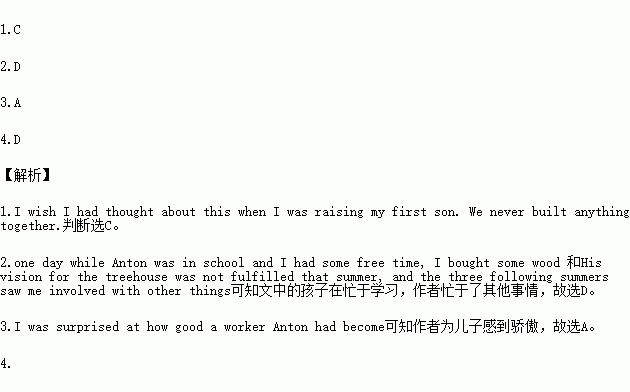题目内容
A
While growing up in Jersey in the 1960s, I always seemed to be building things. One summer I build a model car with my father. It was a simple affair, and as a capable 12-year-old, I could have easily done it alone. But my father spent the time together with me, and before I knew it, we were both out in the garage, working away.
I wish I had thought about this when I was raising my first son. We never built anything together. Oh, we had a lot of fun, for sure. But we never undertook a common work of our hands.
A few years ago, when Anton, my second son, asked if we could build a treehouse in the big silver maple behind our house, his suggestion immediately reminded me of the memory. Yes, I thought. Of course. My second chance. And so, one day while Anton was in school and I had some free time, I bought some wood. But one thing led to another and we got only as far as the ladder and a simple platform. His vision for the treehouse was not fulfilled that summer, and the three following summers saw me involved with other things. In the middle of our quiet supper last night, I looked at Anton, a high school student now and asked, “Anton, are you still interested in finishing the treehouse?” “Sure, Dad,” he said, and within that “sure” was contained, perhaps, his own self-awareness of a childhood to which he was still attached.
We continued where we had left off. I was surprised at how good a worker Anton had become. Where four years ago all he could really do with confidence was hammer nails, now he was measuring and cutting. In one moment that took my breath away, he attempted to center a support beam(支撑梁)while looking to me for direction. “Is it centered, Dad?” I waved him a little to the right. Then a little more. Then I said. “Perfect.”
And it was perfect. As was this second chance, I finally realized that my father hadn't had to help me build that model car in 1966. He wanted to. And that made all the difference.
1.Not having built anything together with his first son, the author felt _____.
A. disappointed B. satisfied
C. regretful D. relieved
2.Why didn't they finish building the treehouse at first?
A. It was too hot those summers.
B. Anton wasn't confident enough.
C. They gradually lost interest in it.
D. They were both occupied with other things.
3.From the fourth paragraph, we can see that the father _____.
A. was proud of his son
B. missed the last chance
C. felt content with the treehouse
D. hoped to finish the work perfectly
4.It can be inferred that the author realized _____.
A. the quiet passing of childhood
B. the difficulty in raising children
C. the children's dependence on their father
D. the significance of undertaking a common work with children
 阅读快车系列答案
阅读快车系列答案
